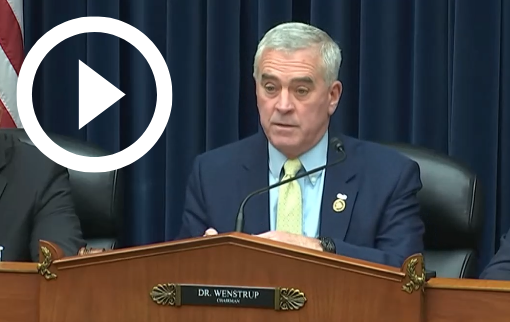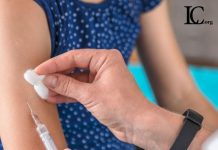Select Subcommittee on the Coronavirus Pandemic Chairman Brad Wenstrup (R-Ohio) opened Thursday’s hearing titled “Assessing America’s Vaccine Safety Systems, Part 1” with a reminder that balanced conversations about the integrity and credibility of vaccinations are important for restoring trust in America’s public health system following the COVID-19 pandemic. Chairman Wenstrup detailed serious shortcomings in vaccine safety reporting and vaccine injury compensation systems that have led to heightened confusion about the efficacy of vaccinations, dismissive answers from the federal government, and public accusations of “misinformation.” The complex and convoluted system of overlapping injury reporting systems was not structured to handle the massive influx of injury claims caused by the COVID-19 vaccine. The Chairman explained that only 11 injury claims out of the more than 12,000 claims that have been filed in the Countermeasures Injury Compensation Program (CICP) have been compensated. Today’s hearing to evaluate the existing strengths and failures of America’s vaccine injury and compensation systems will ensure an improved public health response in the future.
Below are Select Subcommittee Chairman Wenstrup’s remarks as prepared for delivery:
Vaccines are a crucial public health tool which save millions of lives.
As a physician myself, I have administered many doses of vaccines, including COVID-19 vaccines.
In 2020, I even volunteered to participate in the Moderna vaccine trials.
Having this hearing is not “antivax” and I am not “antivax.”
I shouldn’t even have to say that.
But unfortunately, I do.
I’m sure, as I sit here, there are people getting ready to use that very pejorative to discredit this hearing.
Unfortunately, in an era of soundbites and news cycle whiplash, it seems there is little time for nuanced conversations about these topics.
Today, I hope we can have that nuanced conversation about process.
About how we can do better next time.
About how we can restore trust in public health.
I’m very concerned with the hesitancy by many to vaccinate their children.
Testifying before us today are two senior officials who lead the government’s post-marketing vaccine safety systems.
These systems are absolutely critical to keeping the American people safe, but also to earning and preserving their trust.
Our witnesses will discuss how these systems work, what they can do, what they can’t do, and the challenges that they face.
Their testimony is important to design better systems as needed.
One such system, the Vaccine Adverse Event Reporting System, or “VAERS,” is perhaps the best known of these surveillance systems.
VAERS has been the source of attention and controversy since the beginning of the COVID-19 vaccine rollout.
However, concerns about these data are usually met with dismissive replies.
They often point to the fact that VAERS is “unable to prove causality” and contains reports of “people being hit by a car after vaccination.”
They say that VAERS is being misused by anti-vaccine advocates and that it is “misinformation.”
All legitimate concerns.
This seems to ignore many legitimate questions that have been raised.
For example, how does the government utilize this data?
During her testimony before this committee last June, Director Walensky assured us that CDC had “a responsibility to comb through every single [report to VAERS].”
It is unclear if that is true.
People who have submitted reports to VAERS have told my staff they were never contacted by CDC or FDA officials.
A recent British Medical Journal investigation found this too.
It seems that both sides agree there is something wrong.
Further, while serious injuries caused by vaccines are rare, the government has assumed the responsibility to compensate for them.
In doing so, vaccine manufacturers have been shielded from liability.
Therefore, the government has an important duty – one that is essential in preserving trust in vaccines and how we message completely and honestly about them.
Appearing before us today is Commander George Reed Grimes.
Commander Grimes is HRSA’s Director of Injury Compensation Programs and oversees the Countermeasures Injury Compensation Program, or CICP, as well as the Vaccine Injury Compensation Program, or VICP.
Because COVID-19 vaccines were purchased and distributed by the Federal government under the Public Readiness and Emergency Preparedness (PREP) Act, they are covered under CICP.
Whereas most other widely distributed vaccines are covered under VICP.
As of January 2024, CICP has only compensated 11 claims out of the more than 12,000 that have been filed for COVID-19 vaccines.
Because of its design, CICP payouts are also significantly smaller than VICP – an average of about 3,700 dollars compared with almost 500,000 dollars in VICP.
It appears that CICP may not be designed or equipped to handle a vaccine that was so widely distributed – and mandated for many – as COVID-19 vaccines were.
I have concerns that we wouldn’t be able to expect people to line up and get vaccinated during the next pandemic if they feel they are abandoned?
Again, this testimony is important in designing better systems and establishing best practices.
I hope this hearing will provide us with an opportunity to discuss what lessons were learned during the pandemic about our vaccine safety and surveillance systems.
These lessons, I believe, are critical in preparing for future pandemics.
I look forward to a robust and on-topic discussion. Thank you.


















